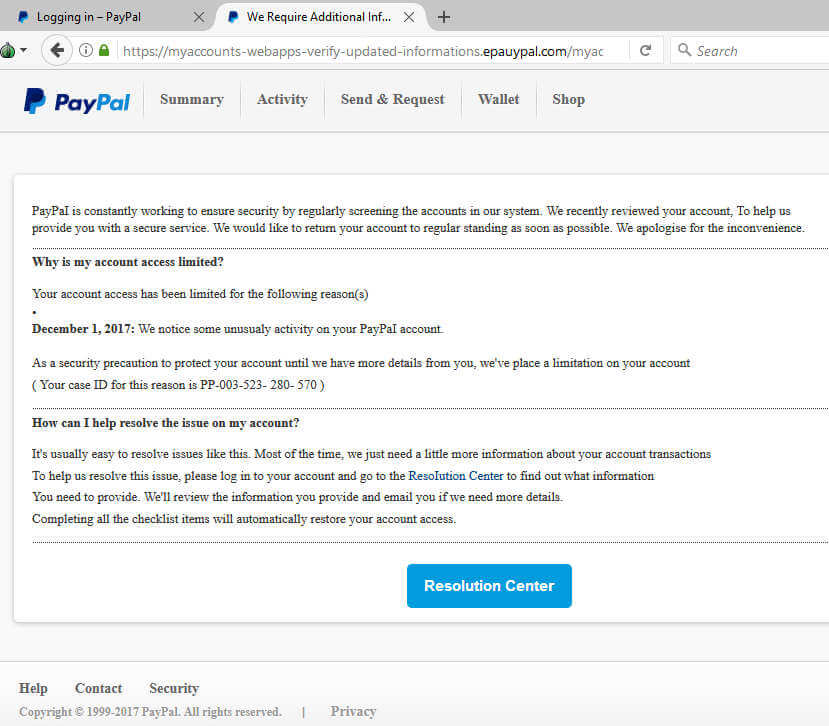

There are several actions you should take to avoid getting scammed: This scam can be quite convincing for multiple reasons: The scammers used email addresses, realistic email designs, and even created fake invoices to create a sense of urgency. This number then directs you to a scam call center that will try to get your PayPal login details and other personal information. The email will urge you to call a number to cancel the transaction. In this scam, you get an email warning you of “suspicious activity” in your PayPal account, usually with large transactions involved. Scammers often use this to their advantage, set up fake charities or donation sites and ask you for contributions via PayPal to fake charities. In case of natural disasters, for example, many people search for local charities where they can donate to relief efforts. The scammer wants you to ship the product and provide the tracking number before you get paid and if you do, the fraudulent buyer gets the item and disappears without paying. They message you, claiming to have made the payment, but that PayPal won’t release the money to you until you provide a shipment tracking number. Any payments made like this are no longer protected by the PayPal protection program, and once you transfer money this way for goods, you have no recourse against fraud claims.Ī buyer will engage with you on PayPal to pay for an item you sell. Although this may sound good because it eliminates the fee that PayPal levies on standard sale transactions, paying for goods is not permitted under the Friends and Family money transfer option. Sometimes, a scammer will ask you to transfer money using PayPal’s Friends and Family option. This is not a scam in and of itself, but rather a measure that scammers take to leave you without options after defrauding you. The buyer gives a fake shipping address: When the shipping company cannot deliver the package to the invalid delivery address provided, the scammer will then step in and provide a new, legitimate delivery address, but since the package gets rerouted, the buyer will allege they never received the item.The buyer provides their own shipping label: The buyer will offer to send you a pre-paid shipping label, reroute the package to a different delivery address and claim they never received the item.Since you cannot prove the item wasn’t received, you’re out the money, the item, and even the shipping fees.
PAYPAL SPAM EMAIL FULL

Several types of common PayPal scams involve shipping addresses including:

If you sell items online, then you’re the target audience for these scams. Unlike unsolicited emails that lead you to a fake PayPal site, these scam methods involve actually engaging with you on the real PayPal platform. Scammers have a ton of shipping tricks up their sleeve to try and steal your money from PayPal. The only catch is that you first must send a small sum via PayPal to cover transaction fees (or some other fake expense), but once you send the small sum, you never hear from the scammer again, and you are out the money you sent. This scam plays on emotion, sending you an email notification that you’ve won, inherited, or are entitled in some other way to receive a considerable sum of money from an unexpected source. If you click on the link and enter your login credentials, the scammers get access to your credentials and can drain your account. Like other email scams, the link in the email directs you to a fake PayPal website. The email will tell you that you must log in to your PayPal account to verify a few details to claim that reward. With this scam, you receive an email offering a cash rebate or other financial incentive. The “promotional offer” or “you have money waiting” scam These scams are some of the most common social engineering attacks designed to gain access to your PayPal account.Ģ. You may receive a phishing email claiming an issue with your PayPal account, and the email will also include a link and a request that you click on it to log into your account.
PAYPAL SPAM EMAIL HOW TO
Cybersecurity expert Theodor Porutiu from outlines the most common PayPal scams of 2023 and how to avoid them:Įmail is a scammer’s preferred method of stealing your money.


 0 kommentar(er)
0 kommentar(er)
